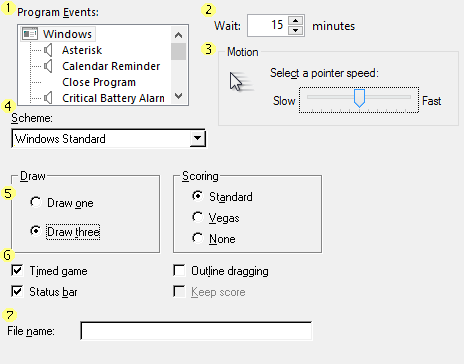Jan's Working with Windows:
Dialogs
A dialog box is a special purpose window which asks for your input. You may have to type in something, like your name or a file name. You might need to select Yes or No in answer to a question. There are several types of inputs to help make it all easier for you. You have seen some types of input in the Mouse Properties dialog box. Now you will see some others.
Type of Input Controls
Here you can see what the most common types of dialog box inputs look like. These samples are selected from the Display Properties, Solitaire Options, and Open dialog boxes. You won't find them all together like this anywhere!

How they work
(But, the examples in the illustration don't work!)
![]() Click on
an item in the list box to select it. Use the scroll bar to see items out of view.
Click on
an item in the list box to select it. Use the scroll bar to see items out of view.
![]() Use the tiny arrows in the spin control box to move through the list of available values. Only one value will be visible at a time. You can also type in a value. This type of input is used a lot for numbers.
Use the tiny arrows in the spin control box to move through the list of available values. Only one value will be visible at a time. You can also type in a value. This type of input is used a lot for numbers.
![]() Drag the slide to a new point. Most slides do not have continuous values. Instead they let you position the slide pointer only at specific spots.
Drag the slide to a new point. Most slides do not have continuous values. Instead they let you position the slide pointer only at specific spots.
![]() Clicking the down arrow will open up a drop list of choices. Click on your choice
just like in a list box.
Clicking the down arrow will open up a drop list of choices. Click on your choice
just like in a list box.
![]() Click on the circle of your choice, called a radio button. In a group of radio buttons,
only one choice can be chosen at a time. "Draw" and "Scoring" are separate
groups.
Click on the circle of your choice, called a radio button. In a group of radio buttons,
only one choice can be chosen at a time. "Draw" and "Scoring" are separate
groups.
![]() Click a checkbox to
select it. In a group of checkboxes, any number of boxes can be checked at
the same time. The "Keep score" checkbox is in gray instead of black if it
is not available to be chosen right now.
Click a checkbox to
select it. In a group of checkboxes, any number of boxes can be checked at
the same time. The "Keep score" checkbox is in gray instead of black if it
is not available to be chosen right now.
![]() Click in the text box and then type your entry.
Click in the text box and then type your entry.
By the way, the name radio button comes from an old type of car radio which had round push buttons on the front. You could set each button for a particular radio frequency. You could just push the button to switch stations instead of having to carefully tune in the signal. This probably prevented a lot of auto accidents!
Tabs
Dialogs with tabs can show you a large number of choices in a small space. Just click on a tab label to bring that tab to the front.
![]() Try it on
the image below.
Try it on
the image below.

![]() The keystroke
combo CTRL + TAB will bring the next tab to the front. (But not on the
image above!)
The keystroke
combo CTRL + TAB will bring the next tab to the front. (But not on the
image above!)
